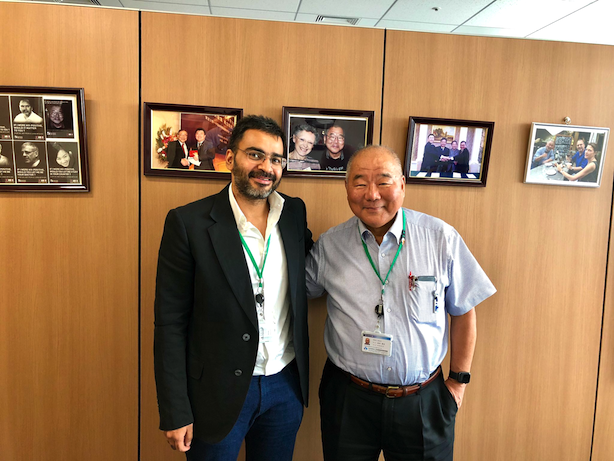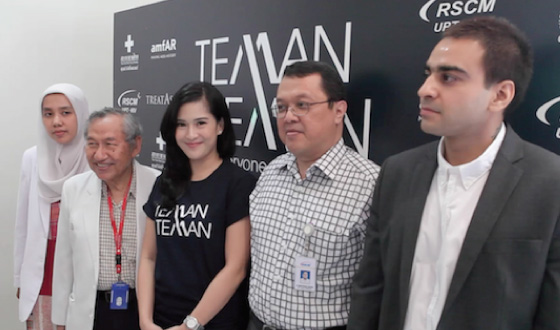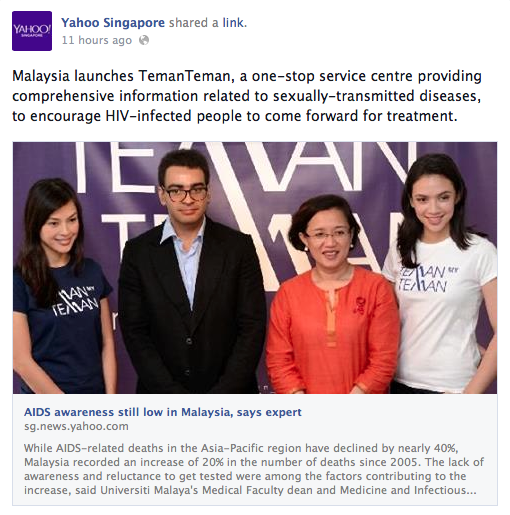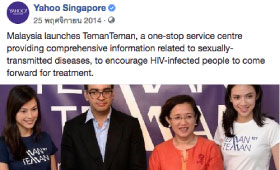|
|
Adam's Love and TemanTeman.org CEO Mr. Tarandeep Anand (left), CEO of Adam's Love with Prof. Aikichi Iwamoto, MD, DMSci. (Right) the Managing Director of Department of Research Promotion at Japan Agency for Medical Research and Development (AMED) in Tokyo, Japan during September 2019 Japan Research Visit View Mr. Tarandeep Anand's NCBI - NIH Bibliography at US National Library of Medicine, National Center for Biotechnology Information Search for Mr Anand's publications in: PubMed • Google Scholar Mr. Tarandeep Anand is the CEO and founder of Adam’s Love (adamslove.org) and TemanTeman.org (www.temanteman.org). Through Mr. Anand's visionary leadership Adam’s Love and TemanTeman.org have been awarded implementation and research grants from MAC AIDS Funds, TREAT Asia, The Sumitomo Foundation, Aids Fonds, ViiV Healthcare, LINKAGES/USAID, amfAR – The Foundation for AIDS Research and The US National Institutes of Health (NIH)’s National Institute of Allergy and Infectious Diseases, Eunice Kennedy Shriver National Institute of Child Health and Human Development, National Cancer Institute, National Institute of Mental Health, and National Institute on Drug Abuse as part of the International Epidemiology Databases to Evaluate AIDS (IeDEA; U01AI069907) for conducting advanced data analysis of Adam’s Love. Mr. Anand is also a pioneer in piloting, implementing and publishing data on impact of technology-based HIV prevention intervention and novel service delivery models in Asia Pacific. Scientific manuscripts on Adam’s Love and TemanTeman.org Online-to-Offline models and technology-based HIV prevention interventions have been published in high impact journals including Journal of International AIDS Society (JIAS), Current Opinion in HIV and AIDS, AIDS Care, and Journal of Virus Eradication. Since 2012, scientific abstracts have been selected and presented at international conferences including the International AIDS Conference, the IAS Conference on HIV Science, European AIDS Conference and HIV Drug Therapy Glasgow. Adam's Love presentation at EACS2019 Basel Switzerland by Mr. Tarandeep Anand
Search for Mr Anand's publications in: PubMed • Google Scholar CEO's Perspective on harnessing emerging technologies to increase testing How “emerging technologies can be harnessed to increase HIV testing” is what I had inquired back in 2010, and led to the establishment of Adam’s Love and TemanTeman.org, major HIV services scale-up innovations for MSM and Transgender women (TG), now serving millions of online key populations globally and offering sexual risk, behavioral counseling and linkage support to over 25,000 MSM, TG and youth annually. As we get swept away by the “Amazon effect,” witness blurring lines between online and offline worlds, a sense of urgency to transform HIV service delivery is apparent. I will try to reflect on where we are and how we can benefit from the technology tailwinds to help implementers scale-up services. 1. Online-to-Offline (O2O) models. My instant response is to use O2O models that enable seamless transition, dramatically reduce the linkage time and demonstrate high linkage success. Digital bookings and QR codes used help ensure key populations confidentiality. 2. Chatbots vs. human interaction. A person recently exposed to HIV is often in desperate need for human support/counseling as opposed to automated responses. Online channels operate 24x7 and have no time or logistic barriers. This is where most initiatives run out of gas, get cumbersome for implementers and result in lost interest among users seeking instant gratification, so identifying passionate professionals is key. 3. Performance incentives. In recent HIV self-testing study supported by amfAR, we found that digital literacy and ICT skills are intrinsically high among Thai counselors/communities. Incentivizing online staffs who deliver indispensable services based on targets achieved, could have a major impact on the epidemic. Paying social media giants to promote testing advertisements might help researcher enhance recruitment on a one-time basis, but this is not a sustainable path. 4. Emphasize digital culture. The implementers of most technology-based interventions are public health experts with limited background in technology, marketing or customer service. An innovative workforce with appropriate background would bring fresh synergies. 5. Understand what you fund. To create “blue oceans,” funders should employ experts well-versed with important parameters for adequate assessments of tech programs, sustain what is working, and harness published data as value for setting standards for funding.  Please also visit our ongoing regional program sites in Indonesia, Malaysia, Taiwan and Thailand. TemanTeman.org Indonesia |
















